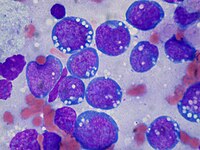
Loss of Setd4 delays radiation-induced thymic lymphoma in mice.
Sign Up to like & getrecommendations! Published in 2019 at "DNA repair"
DOI: 10.1016/j.dnarep.2019.102754
Abstract: Radiation-induced lymphomagenesis results from a clonogenic lymphoid cell proliferation due to genetic alterations and immunological dysregulation. Mouse models had been successfully used to identify risk and protective factors for radiation-induced DNA damage and carcinogenesis. The… read more here.
Keywords: setd4; lymphoma; radiation induced; lymphomagenesis ... See more keywords

The X-linked helicase DDX3X is required for lymphoid differentiation and MYC-driven lymphomagenesis.
Sign Up to like & getrecommendations! Published in 2022 at "Cancer research"
DOI: 10.1158/0008-5472.can-21-2454
Abstract: The X-linked gene DDX3X encodes an RNA helicase that is mutated at high frequencies in several types of human B-cell lymphoma. Females have two active DDX3X alleles and males carry a DDX3Y homolog on the… read more here.
Keywords: lymphomagenesis; driven lymphomagenesis; helicase ddx3x; ddx3x ... See more keywords

PARK2 Regulates eIF4B-Driven Lymphomagenesis
Sign Up to like & getrecommendations! Published in 2022 at "Molecular Cancer Research"
DOI: 10.1158/1541-7786.mcr-21-0729
Abstract: Abstract Patients with high-risk diffuse large B-cell lymphoma have poor outcomes following first-line cyclophosphamide, doxorubicin, vincristine, prednisone, and rituximab (R-CHOP); thus, treatment of this fatal disease remains an area of unmet medical need and requires… read more here.
Keywords: park2 regulates; lymphomagenesis; protein translation; park2 ... See more keywords

SETD2 haploinsufficiency enhances germinal center-associated AICDA somatic hypermutation to drive B cell lymphomagenesis.
Sign Up to like & getrecommendations! Published in 2022 at "Cancer discovery"
DOI: 10.1158/2159-8290.cd-21-1514
Abstract: SETD2 is the sole histone methyltransferase responsible for H3K36me3, with roles in splicing, transcription initiation and DNA damage response. Homozygous disruption of SETD2 yields a tumor suppressor effect in various cancers. However, SETD2 mutation is… read more here.
Keywords: lymphomagenesis; dna damage; somatic hypermutation; setd2 haploinsufficiency ... See more keywords

Calorie restriction alters the mechanisms of radiation-induced mouse thymic lymphomagenesis
Sign Up to like & getrecommendations! Published in 2023 at "PLOS ONE"
DOI: 10.1371/journal.pone.0280560
Abstract: Calorie restriction (CR) suppresses not only spontaneous but also chemical- and radiation-induced carcinogenesis. Our previous study revealed that the cancer-preventive effect of CR is tissue dependent and that CR does not effectively prevent the development… read more here.
Keywords: calorie restriction; lymphomagenesis; group; radiation ... See more keywords